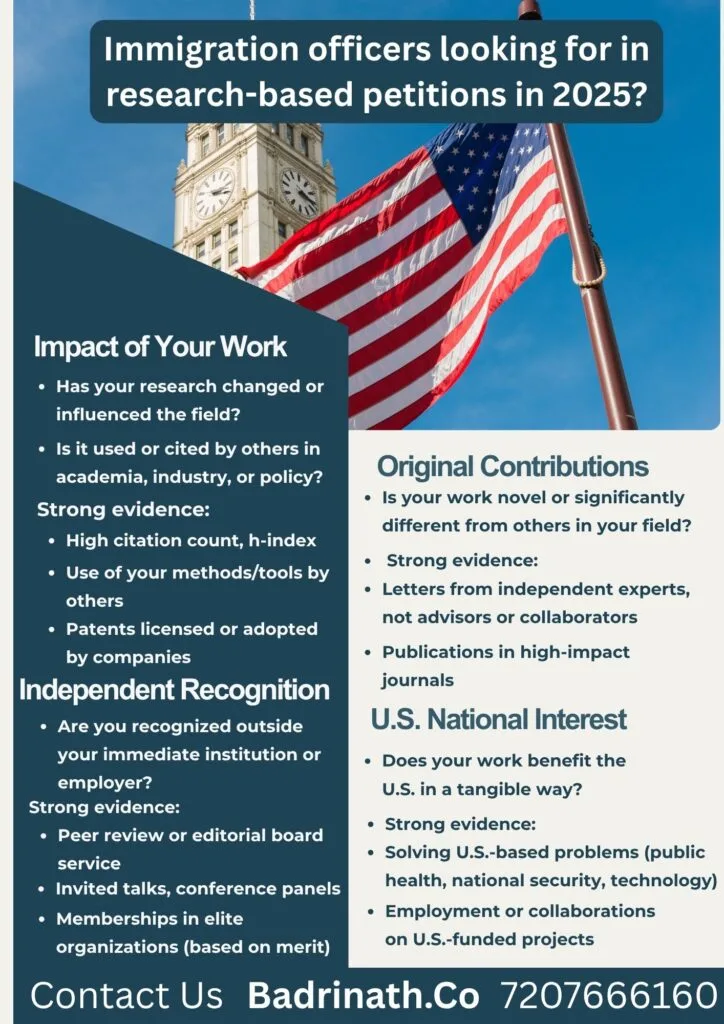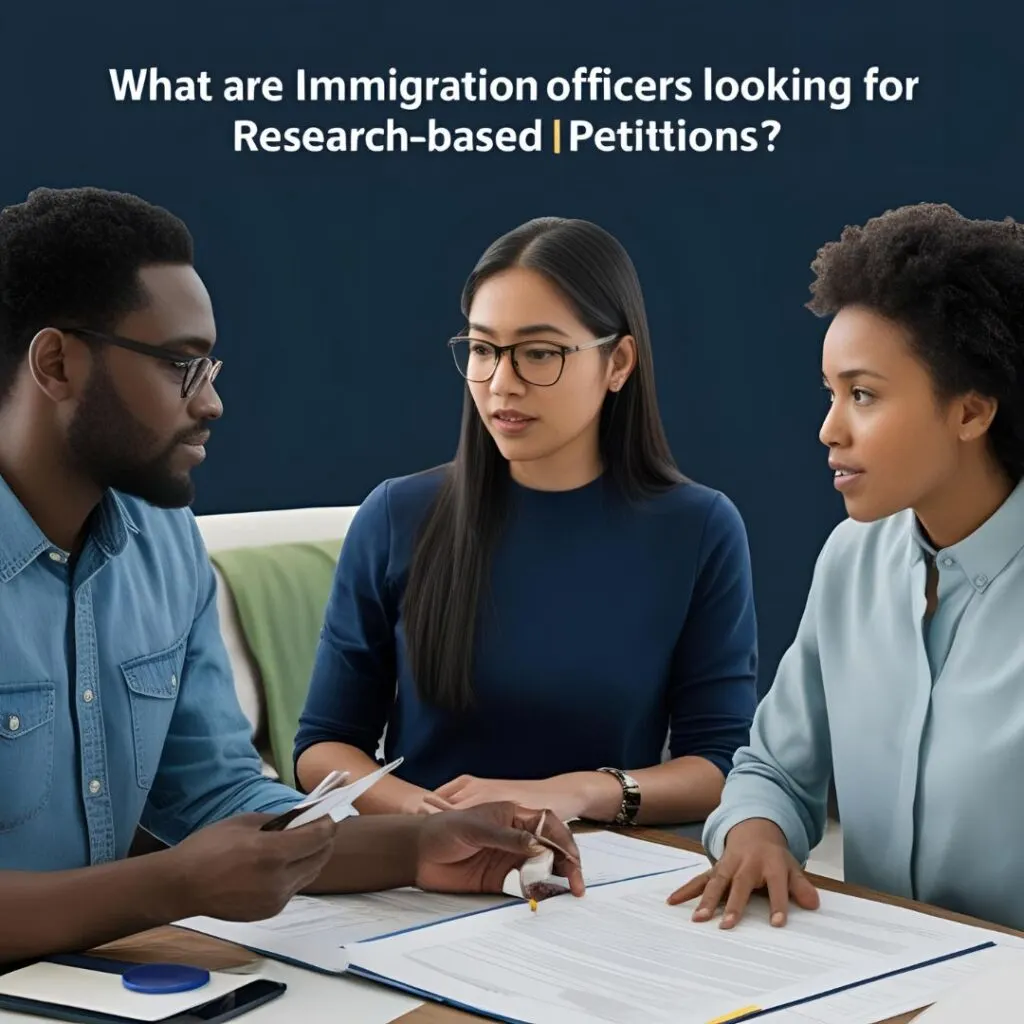Research-Based Petitions look beyond basic eligibility criteria to assess the researcher’s potential long-term impact on American innovation. In 2025, immigration officers evaluating research-based petitions apply rigorous standards to identify candidates who will make significant contributions to the United States. Research-based petitions typically fall under the EB-1 (extraordinary ability/outstanding researchers) or EB-2 (advanced degree/exceptional ability with National Interest Waiver) categories. Understanding what officers scrutinize can significantly improve petition success rates.

Key Evaluation Criteria for EB-1 Research Petitions
Evidence of Extraordinary Ability and Sustained Acclaim
Immigration officers in 2025 seek substantial evidence that the researcher has “extraordinary ability” demonstrated through “sustained national or international acclaim.” This requires extensive documentation showing the researcher’s achievements are recognized in their field.
The USCIS has recently updated its guidance to clarify that:
- Team Awards Now Count: Officers now consider participation in team awards to satisfy the criterion for nationally or internationally recognized prizes. This is particularly relevant for researchers who often work in collaborative environments.
- Past and Present Memberships: Unlike previous years, USCIS now considers both current and past memberships in prestigious associations, allowing researchers to leverage their complete professional history.
- Published Material Requirements Loosened: The requirement that published material about the applicant must explicitly highlight both the value of their work and their specific contributions has been removed. This makes it easier for researchers to use publications discussing their work as supporting evidence.
Intent to Continue Research Work
Officers verify that the researcher intends to continue working in their field of extraordinary ability. For research-based petitions, this means demonstrating ongoing research projects, future grant applications, or employment offers from research institutions.
Substantial Benefit to the United States
A critical factor officers evaluate is whether the researcher’s work will “substantially benefit” the United States in the future. While not precisely defined in regulations, officers make fact-dependent assessments of how the research might advance American interests in science, technology, healthcare, education, or economics.
EB-2 National Interest Waiver Considerations
For researchers seeking the EB-2 classification with a National Interest Waiver (which allows bypassing the labor certification process), immigration officers in 2025 focus on three key elements:
Exceptional Ability Assessment
Officers look for evidence meeting at least three of these criteria:
- Advanced degrees relevant to the research field
- Letters documenting at least 10 years of full-time experience
- Professional licenses or certifications
- Evidence of commanding above-average compensation
- Membership in professional associations
National Importance of the Research
Officers evaluate whether the research:
- Has substantial merit and national importance
- Advances valuable technology or scientific knowledge
- Addresses critical national challenges (climate change, public health, etc.)
- Has potential economic benefits, such as job creation
Well-Positioned to Advance the Research
Immigration officers assess whether the researcher is well-positioned to advance their work by examining:
- Educational background and specialized knowledge
- Track record of prior research successes
- Detailed research plans with feasible methodologies
- Progress already made in the research area
- Support from other experts, institutions, or funding sources
Documentation Strategies That Impress Officers in 2025
Successful research-based petitions in 2025 include comprehensive evidence packages that:
Highlight National Security Connections: When applicable, explain how the research benefits U.S. national security, energy independence, or strategic interests
Quantify Impact: Provide citation counts, journal impact factors, and comparison metrics showing how the researcher’s work outperforms others in the field
Include Expert Testimonials: Feature letters from independent experts (not just colleagues or collaborators) who can objectively assess the researcher’s contributions
Demonstrate Commercial Applications: Show how the research has practical applications or commercial potential
Present Media Coverage: Include mainstream or specialized media coverage of research findings

Recent Trends in 2025 Adjudications
Immigration officers in 2025 are increasingly focusing on:
- Interdisciplinary Research: Research that crosses traditional boundaries and addresses complex problems from multiple angles
- Emerging Technologies: Particularly AI, quantum computing, biotechnology, and renewable energy
- Public Health Contributions: Research addressing global health challenges and pandemic preparedness
- Sustainability Focus: Environmental research that addresses climate change and resource conservation
- Data-Driven Innovation: Research leveraging big data to address social and scientific challenges
Conclusion
Finally in 2025, immigration officers evaluating research-based petitions look beyond basic eligibility criteria to assess the researcher’s potential long-term impact on American innovation, economic competitiveness, and national interests. Successful petitions thoroughly document not just past achievements but also future potential, positioning the researcher as someone whose admission will substantially benefit the United States in an increasingly competitive global research landscape.
Keywords for SEO
- Research-based petitions 2025
- EB-1A immigration process
- EB-2 NIW requirements
- Immigration officers research petitions
- Extraordinary ability in research
- Immigration petition for researchers
- EB-1A petition criteria
- Supporting documents for EB-1A
- National interest waiver (NIW) 2025
- Immigration for researchers
Read More About the Topic
External Links
Government Monitoring of Immigrants’ Social Media
Internal Links
Advanced Degree Eligibility: How Your Master’s or PhD Qualifies You for EB-2







